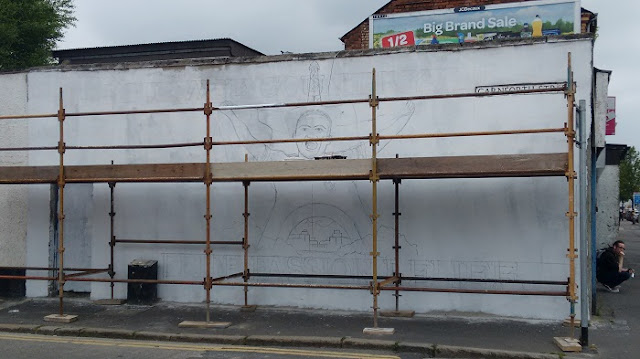You don’t have to know much about Northern Ireland to know
that we have murals … lots of murals … I’ve written
before about how they act as social barometers, with changing themes and
emphases reflecting wider concerns within varies communities. While even a
basic Google image search will return plenty of images of Northern Ireland’s murals,
I recently noticed that there are relatively few images out there of murals
during construction. It’s easy to see why so few such images exist – it’s a relatively short process (a matter of days) in
relation to the amount of time they’re visible for (frequently several years).
There’s also the issue that – especially for the more sectarian examples - many
artists may be reluctant to be filmed or photographed.
In June of last year, in the run up to the Euro 2016 soccer
competition in France, a gable wall at the junction of Carnforth Street and the
Albertbridge Road in East Belfast was chosen to receive a tribute to the
Northern Ireland soccer team. I passed by there every morning on my way to work
and in the evening on my way back home. For the want of anything better than
creating a personal record, I took a couple of photos every day and watched the
piece come together. I’d rather forgotten about them until recently, when I was
having a bit of a clear-out and trying to make some space on a hard drive. I
present them now for what they are. The mural is not high art – but, then
again, no one ever claimed it was. In every sense, it is a piece of
contemporary folk art. Perhaps naive and unsophisticated in composition and
technique, but it still conveys passion for the team at having secured a place
in a major competition. While they never made it out of their Group, losing to
Poland, Germany, and Wales (though they did beat Ukraine 2-0 … sorry Sergey!),
the mural is more about the joy and support of the fans. In any event,
recording this piece of ephemera is – to me at least – an act of urban
anthropology and historical collecting. Putting these images in the public sphere
gained a somewhat greater urgency in recent times as – over the last week or so
– the buildings further along the street from here are being demolished. For
now at least, the two buildings closest to the camera are under no threat, but
it does underline the fragility and ephemerality of this form of decoration and
cultural comment.
 |
| June 4th |
 |
| June 6th (Morning) |
 |
| June 6th (Evening) |
 |
| June 7th |
 |
| June 8th |
 |
| June 9th |
 |
| June 13th - complete |
Note
As it turns out, the unfinished mural – complete with
blurred-out artist – was caught by the Google Street View camera. Judging by
the degree of completeness, the image appears to have been captured on June 6th.











Comments
Post a Comment